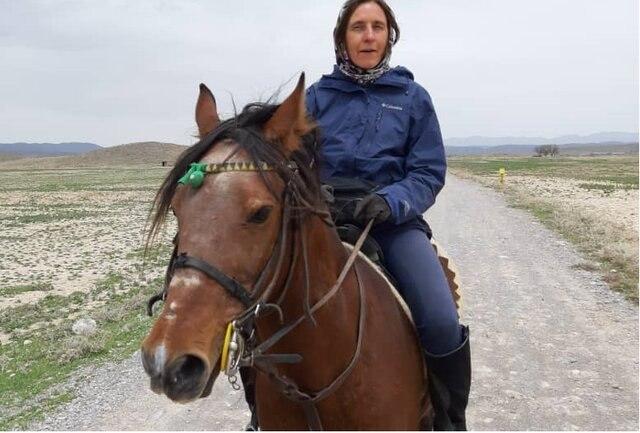The German physician’s main motive for visiting Iran was to ride on a thoroughbred horse along an ancient route in the southern province of Fars that connects Parseh (Persepolis) to Pasargadae, just like what the people of ancient Iran did.
Iranian tour leader Amir Miri was in charge of organizing the German visitor’s horseback journey in conformity with the health protocols and precautionary measure. He hosted Orlika in his countryside inn for a couple of days before starting the journey.
“Orlika was in Iran last week. I wonder how she could have traveled to the heart of Iran under such conditions. She began her journey from Isfahan and then traveled to Yazd and Fars,” Miri told ISNA.
The tour leader said he had come up with the idea of operating a caravan for a trip between Pasargadae and Persepolis several years ago.
“In order to launch such caravan, we needed to breed purebred horses. ‘Dare Shoori’ is one of the horse breeds indigenous to Fars,” Miri noted.
“Riding on purebred horses that are kept and bred in local communities is one of the things the foreign tourists can experience. The horses in the equestrian clubs are more trained and are like the cuisine in restaurants. They work in the same way and method all over the world. But the indigenous horses, like the local dishes, are among the ecotourism attractions. Every horse has a different performance according to its habitat and its owner’s treatment. Horse riding in the ancient area of ‘Kamin’ (a plateu near Pasargadae) is as enjoyable as eating ‘Sirmookey Dampokhtak’ in Aghamir cottage,” Miri said of his countryside guesthouse.
The tour leader then explained that organizing a three-day tour package for land travel between Parseh and Pasargadae takes a lot of energy and time. “So it required a great deal of effort to make the arrangements.”
Miri said while the coronavirus outbreak had shut down the tourism industry, Orlika showed up and applied for the journey. “The German doctor believed that the coronavirus must be indigenized and deal with. One of the ways to fight (against the disease) is to have a strong body and take nutritious foods. In spite of all problems, Orlika became our first guest in year 1399.”
The German physician’s trip to Iran amid the global concerns about the coronavirus pandemic has even surprised her host.
“Taking the risk of traveling to Iran, experiencing horse-riding in ‘Kamin’ ancient area, traveling the ancient route between Parseh and Pasargadae and visiting the areas near the palaces of Cyrus the Great in Pasargadae have marked a pure experience,” Miri concluded.
